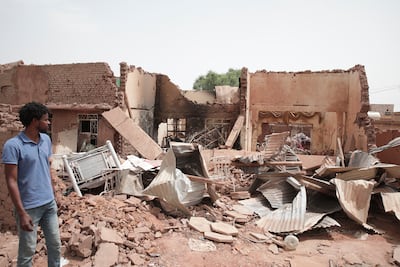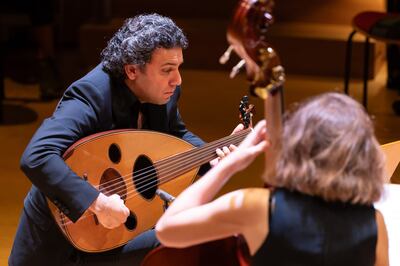When Ahmad Shamma awoke on the morning of May 1 in his apartment in suburban Khartoum, fears of Sudan’s brewing military conflict engulfing the city were not immediately on his mind.
Surely a breakthrough would somehow occur and wiser heads would prevail, he thought.
Those hopes literally came crashing down hours later.
As the principal of Bait Al Oud Khartoum, a music conservatory dedicated to the oud, he was working on the new semester's syllabus when jet fighters suddenly roared overhead and missiles rained over nearby buildings.
Shamma, who was born in Baghdad and grew up during the First Gulf War, didn’t think twice about what was happening.
After closing the windows, he hid inside his apartment amid the gunfire and explosions and pondered an escape plan. Not long after, his mobile phone buzzed with instructions from a friend to leave his home within minutes.

A car arrived and there was no room for luggage.
Without thinking, Shamma grabbed his nearest oud – one of five at home – and jumped in to begin a one-week journey to safety.
This included a fraught five-day bus ride to the Sudanese border city of Wadi Halfa before a car drive to the Egyptian city of Aswan and ultimately a flight back home to Baghdad via Dubai.
All the while that oud was by his side, his only memento from his Khartoum home, which was subsequently looted.
Shamma tells me this on Wednesday when unclasping the instrument from its battered case backstage at the Pierre Boulez Saal in Berlin, Germany.
It was the opening night of the Arabic Music Days concert series and Shamma performed an emotional set of compositions traversing his influences, from the traditional Arab sounds of Sama’I Hijaz to the bluesy undertones of Sparke and A Weave of Imagination.
Organised by the Abu Dhabi Festival as part of its international cultural programme of concerts, the event was Shamma's first performance since his escape from Khartoum.
He dedicated the concert to the people of Sudan, alongside those of Morocco and Libya who tragically suffered through their own natural disasters this week.
“I had a growing sense of anxiety in the hours leading up to the show,” he tells The National.
“My last public concert was in Khartoum in April, and this is a really important event in a prestigious place and in front of a learned crowd.
“Also, the whole idea of these concerts is to celebrate the oud, this instrument that has been a big part of my life. Fortunately, the concert was a brilliant experience and I do feel happy and relieved at the same time.”
Arabic Music Days is also partly a family affair.
It is curated by his uncle Naseer Shamma, a pioneering and prolific Iraqi composer renowned for expanding the oud’s appeal internationally by blending its traditionally rooted sounds with classical and western music elements.
Shamma is also the founder of Bait Al Oud, one of the rare conservatories solely dedicated to studying the oud, which has a range of international schools including in Algiers, Cairo, Baghdad, Abu Dhabi and Manama.
The Berlin event is a showcase of sorts for the institution Bait Al Oud with each of the five evening concerts – to be concluded by a performance by Naseer Shamma himself – featuring oud instructors and former students.
One of them is Egypt’s Sherine Tohamy, an Abu Dhabi resident and the first female graduate from Bat Al Oud in Cairo.
“Those of us who love and play the oud are family and we seek each other out,” Shamma says.
“Everywhere I travel I see people who tell me about the oud, how it changed them as a person and opened their minds to not only music, but an understanding of its history and heritage.”

Bait Al Oud formalises that knowledge through its syllabus.
As part of the introductory course which Shamma was preparing on that fateful morning in Khartoum, sessions will partly be dedicated to the history of the oud – a stringed instrument dating back to ancient Iraq around 5,000 years ago.
When it comes to the first batch of performance classes, painstaking attention will also be paid to posture and how to hold the risha – an oud pick traditionally made from cow horn.
It is normally at this stage that Shamma can identify the students who are in for the long haul.
“There are some people who play the oud casually for fun and that is absolutely fine,” Shamma says.
“But to really understand the capabilities of the instrument it requires study and knowing some fundamentals and these are the things you can’t learn by ear or on the internet.
“So what happens is a lot of new students will find that mentally challenging, because when they arrived at the school they thought they had sufficient knowledge.
“When we as instructors point out that what they are doing is wrong and can be improved, some find that hard to take.
“This is why the first stage of really learning the oud is to be open and unlearning some of the things picked up outside.”
Isn’t that a slightly rigid approach, I ask? Especially as improvisation is an important part of playing the oud.
“Even improvisation follows a certain structure and form. It’s not all random,” Shamma counters. “To acquire anything meaningful in life requires following a particular path that is often difficult.”
I wonder whether that belief took on greater resonance after Shamma's recent experience fleeing Sudan.
“My experience in Sudan is hopefully not over,” he says. “I can’t wait to return one day and meet my students.”

